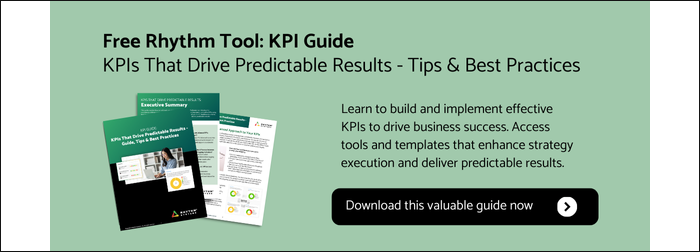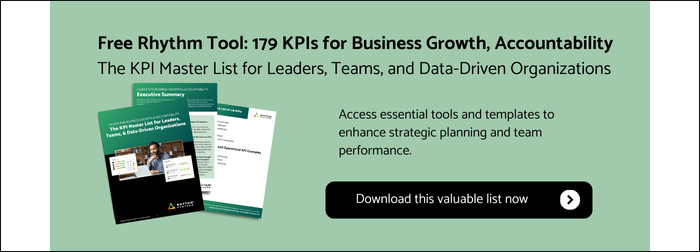Measuring the right Key Performance Indicators (KPIs) is vital to the health and success of your business. However, when onboarding new clients, some want clarification about what they should measure and how to use these powerful tools. They often ask, “Why do we need KPIs?" or “Why use KPIs?" or “Why are KPIs important?" or even “What are KPIs?" as they think their way of doing things isn't broken. Effective KPIs are essential metrics to ensure you can accomplish any business objective. The importance of effective KPIs can't be understated to achieve greater business performance.
What are KPIs?
Understanding how to measure success is crucial in any business. Key Performance Indicators, or KPIs, serve as metrics that track and analyze the effectiveness of various company operations. They are quantifiable measurements that help businesses gauge their performance against their strategic goals. Whether it's boosting sales, enhancing customer satisfaction, or improving operational efficiency, KPIs clearly show where a business stands and where it needs to focus its efforts to achieve desired outcomes.
The most common mistake companies make when measuring their KPIs is to try to measure too much. The problem with this approach is that if you need to know which KPI to measure, how do you know whether you're progressing? If you have yet to learn what you're trying to achieve, you'll never know if you're succeeding or failing.
KPIs are more than the numbers and metrics you report weekly - they enable you to understand the performance and health of your business so that you can make critical adjustments in your execution to achieve your strategic goals. Knowing and measuring the right KPIs will help you achieve results faster. A Key Performance Indicator is a measurable metric that demonstrates how well a company performs against its key business objectives, quarterly rocks, business objectives, and progress towards your 3-5 year strategic plan.
1. KPIs to Monitor Company Health Examples
KPIs are a scorecard for company health. You only need a few KPIs to monitor your company's vital signs. Only measure what you want to move to put energy where you want to effect change. We've found that it is crucial to measure a few KPIs in each of the 4 categories: Employees, Customers, Processes, and Revenue. These fall under the disciplines of human resources, customer satisfaction, business processes, and business strategy. First, make sure you choose the right KPIs for your business, then worry about who is accountable for them (leadership accountability.)
2. KPIs to Measure Progress Over Time Examples
A key performance indicator (KPI) is any measurable result that indicates whether an organization is meeting its objectives. It could be revenue, gross margin, number of locations, number of employees, customer satisfaction, product quality, employee productivity, or anything else. You set these KPIs for yourself and your team every quarter so you know where you stand. Then, you track them weekly to see if they're moving in the direction you want them to go. If not, adjust your actions accordingly and notify other departments if you need to catch up.
3. KPIs to Make Adjustments and Stay on Track
In addition to your current performance, you should monitor your leading indicator KPIs to see how close you are to achieving your goals. These metrics show whether you are on track to reach your desired outcomes. You can then adjust your strategy accordingly. For example, if your sales drop, you may focus more on marketing efforts than product development. Leading indicators have two characteristics: they are measurable, and you can directly influence them. They are good KPIs on your dashboard to keep your projects on track.
4. KPIs to Solve Problems or Tackle Opportunities
Use a combination of KPIs in a dashboard to have the correct information at your fingertips to solve problems or tackle opportunities. Let’s say you are in a sales slump. Identify a handful of KPIs that can help you turn the tide (maybe it is # of outbound calls, # of appointments kept, # of trade shows attended). Put them on a dashboard and track them weekly to see if you’ve found the right lever that helps you generate more predictable sales. Or, let's say you have an excellent idea for a new product. Maybe you test it out with a few clients and use KPIs to validate your business model before launching it on a large scale; you might monitor # of customers interested, $ to support the new product, NPS score, implementation time, # of defects, etc.
5. KPIs to Analyze Patterns Over Time
If you measure the same KPIs quarter over quarter, you can begin to detect patterns in your numbers. There are countless ways these patterns can help you in your business. You can predict your slowest quarter and use that time to do a system update or company-wide training initiative. You can tell that your sales manager always forecasts that you'll come in 5 deals over or under where you usually end the quarter. You can see that you've got some team members who are habitually under-performing or over-performing on their KPIs and can use this data to talk about consequences, bad or good.
An effective KPI dashboard has a mixture of KPIs that follow the balanced scorecard. You want to ensure that you cover all the essential aspects of your business required to monitor your company's progress toward its critical goals and objectives.
Therefore, the top businesses always have at least 2 KPIs (including one leading indicator KPI) from each of the following categories:
- Financial Perspective
- Net Profit
- Net Profit Margin
- Revenue
- Internal Business Perspective (Operational KPIs)
- Revenue Per Employee
- Capacity Utilization
- Customer Perspective
- NPS (Net Promoter Score)
- Repeat Customers
- Employee Perspective
- Employee NPS
- Turnover Rate
To learn more about the importance of KPIs to grow your business, download our free KPI Guide.




